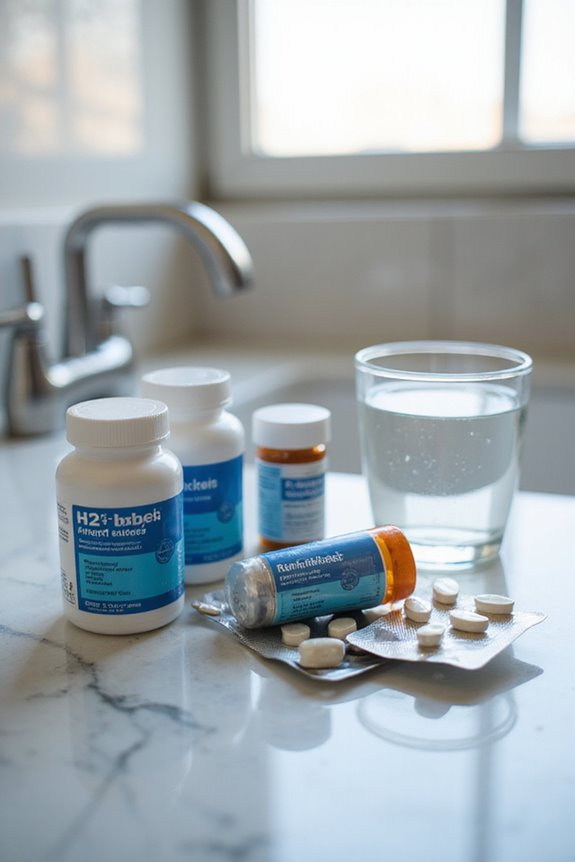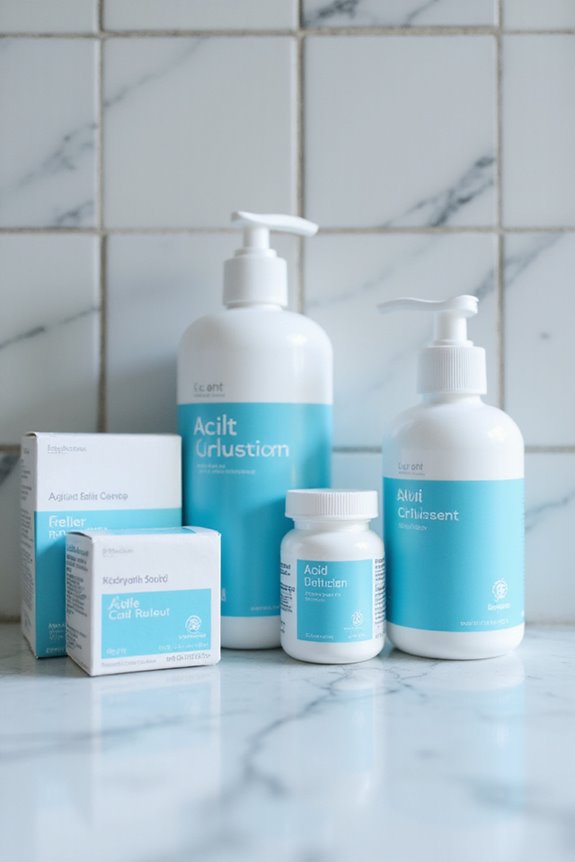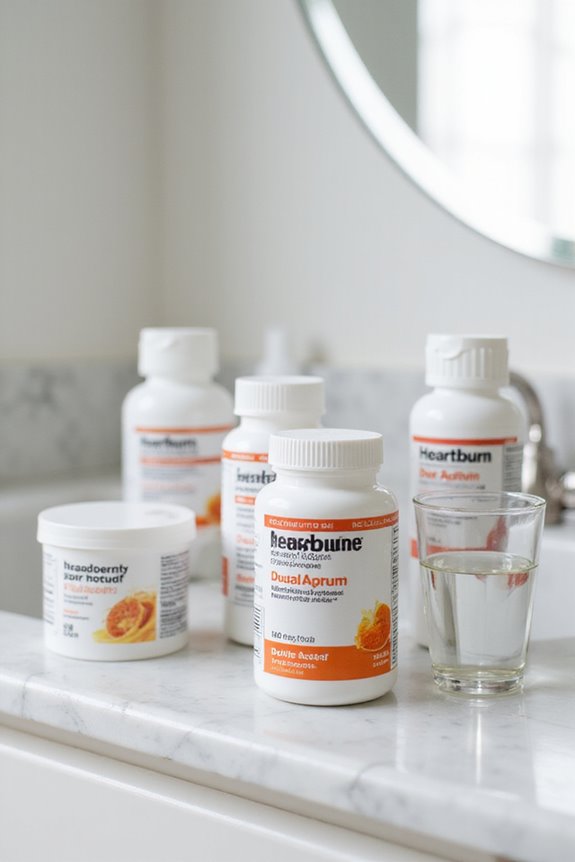Top brands for heartburn and acid reflux include various over-the-counter and prescription medications. Key options are:
- Antacids: Tums, Rolaids, Maalox for quick relief.
- H2 Blockers: Pepcid (famotidine), Tagamet (cimetidine) for moderate symptom management.
- Proton Pump Inhibitors: Nexium (esomeprazole), Prilosec (omeprazole) for long-term control.
Each category has specific usage recommendations and potential side effects. For a thorough understanding of available treatments, further exploration is essential.
Key Takeaways
- Proton Pump Inhibitors (PPIs) like Esomeprazole (Nexium) and Omeprazole (Prilosec) are popular for managing heartburn and acid reflux.
- H2 Blockers such as Famotidine (Pepcid) and Cimetidine (Tagamet HB) offer effective relief with fewer side effects.
- Combination OTC medications like Pepcid Complete and Zegerid OTC provide rapid and long-lasting symptom management.
- Antacids containing calcium carbonate or magnesium hydroxide offer quick relief for occasional heartburn symptoms.
- Long-term use of PPIs should be approached cautiously due to potential risks like pneumonia and chronic kidney disease.
Antacids: Quick Relief Options
Antacids serve as a popular choice for individuals seeking quick relief from heartburn and acid reflux. These medications neutralize stomach acid, providing symptomatic relief within minutes. Common ingredients include calcium carbonate, magnesium hydroxide, and sodium bicarbonate, each with specific action mechanisms and formulations, such as tablets and liquids.
Antacid Safety Tips:
- Follow dosage limitations to prevent side effects, such as diarrhea from magnesium hydroxide or systemic alkalosis from excessive sodium bicarbonate.
- Individuals with sodium restrictions should avoid sodium bicarbonate-based antacids.
Antacid Side Effects:
- Potential side effects may include constipation or diarrhea, depending on the formulation.
- Long-term use is generally discouraged; antacids are designed for short-term relief.
H2 Blockers: Effective Acid Reducers

H2 blockers represent a significant advancement in the management of acid-related conditions, offering effective acid reduction through a specific mechanism of action. These medications competitively inhibit histamine at H2 receptors on stomach parietal cells, resulting in decreased gastric acid production.
Commonly used for peptic ulcer disease and gastroesophageal reflux disease (GERD), H2 blockers provide symptomatic relief for heartburn and dyspepsia.
Key H2 Blocker Comparisons:
- Longer duration of action (6–10 hours) than antacids (1–2 hours).
- Can be taken before meals to prevent heartburn.
- Less effective than proton pump inhibitors for healing erosive esophagitis.
Proton Pump Inhibitors: Long-Lasting Solutions

Proton pump inhibitors (PPIs) represent a significant advancement in the treatment of acid-related disorders, offering long-lasting solutions for individuals suffering from conditions such as gastroesophageal reflux disease (GERD) and peptic ulcers.
PPIs Mechanism
- PPIs irreversibly block the H+/K+ ATPase enzyme, effectively disabling acid production.
- They require activation in the acidic environment of the stomach, leading to a sustained inhibition of acid secretion.
PPI Safety
- Generally safe for short-term use; however, long-term use may pose risks such as higher chances of pneumonia and chronic kidney disease.
- Observational studies suggest weak associations with neurodegenerative diseases.
Combination OTC Medications: Dual-Action Relief

Combination over-the-counter (OTC) medications have emerged as a practical solution for individuals seeking both immediate and extended relief from heartburn and acid reflux. These combination therapies typically include an antacid paired with an H2 blocker or a proton pump inhibitor (PPI), allowing for effective symptom management.
- Antacids provide rapid acid neutralization, offering quick relief.
- H2 blockers, like famotidine, reduce acid production for longer-lasting effects.
- PPIs, such as omeprazole, further suppress acid secretion.
Popular products include Pepcid Complete, which combines famotidine with antacids, and Zegerid OTC, which pairs a PPI with sodium bicarbonate. These combinations are designed to improve adherence by reducing the necessity for multiple doses, ultimately enhancing patient outcomes in managing heartburn and acid reflux symptoms.
New FDA-Approved Treatments: Innovative Options

The introduction of new FDA-approved treatments for gastroesophageal reflux disease (GERD) marks a significant advancement in the management of this common condition. Among these, Vonoprazan (Voquezna) stands out as the first potassium-competitive acid blocker (P-CAB) approved in over three decades, offering unique benefits.
- Mechanism: Vonoprazan utilizes P-CAB mechanisms to compete with potassium ions in gastric proton pumps, enabling faster and sustained acid suppression.
- Efficacy: Clinical studies, including the phase 3 PHALCON-EE trial, demonstrated superior acid reduction and significant heartburn symptom relief.
- Availability: Expected by late 2023, Vonoprazan provides a compelling alternative for patients inadequately managed by traditional proton pump inhibitors (PPIs), enhancing overall treatment options in GERD care.
Over-the-Counter Heartburn Brands: Popular Choices
Over-the-counter (OTC) heartburn medications offer an accessible solution for individuals seeking relief from gastroesophageal reflux disease (GERD) symptoms. These products typically fall into three categories:
- Antacids: Provide rapid, short-term relief by neutralizing stomach acid. Common brands include Tums and Rolaids.
- H2 Blockers: Such as Pepcid AC, reduce acid production for longer-lasting effects, taking about one hour to work.
- Proton Pump Inhibitors (PPIs): Brands like Prilosec OTC and Nexium 24HR block acid production effectively, suitable for frequent heartburn.
Additionally, some individuals may explore natural remedies and dietary adjustments alongside OTC options, enhancing overall management of heartburn symptoms. It is essential to consult a healthcare professional if symptoms persist despite OTC treatment.
Prescription Heartburn Medications: Leading Brands
Prescription heartburn medications are critical for managing gastroesophageal reflux disease (GERD) and providing relief for patients experiencing frequent heartburn.
Proton Pump Inhibitors (PPIs)
- Esomeprazole (Nexium): Top-selling PPI with significant efficacy for GERD; generated $6 billion in sales in 2012.
- Omeprazole (Prilosec): Available in prescription and generic forms; offers similar PPI effectiveness at a lower cost.
- Lansoprazole (Prevacid): Often prescribed for frequent heartburn; available in delayed-release formulations.
- Pantoprazole: Reduces stomach acid and aids in healing; widely used for GERD management.
- Zegerid: Combines omeprazole and sodium bicarbonate for immediate and sustained acid reduction.
H2 Blockers
- Famotidine (Pepcid): Effective for GERD, available in OTC and prescription forms.
- Cimetidine (Tagamet HB): Less commonly prescribed due to interactions, but still relevant.
H2 blocker comparisons show fewer side effects but lower effectiveness for severe symptoms.
Choosing the Right Heartburn Treatment: Key Considerations
When considering heartburn treatment options, what factors should be prioritized to guarantee effective management?
Effectiveness
- Antacids offer rapid, short-term relief.
- H2RAs provide longer-lasting control but take up to 30 minutes to act.
- PPIs are most effective for chronic GERD but require days for maximum benefit.
Safety
- Antacids generally have minimal side effects; H2RAs may lead to increased costs.
- PPIs raise concerns about long-term health issues.
Cost and Accessibility
- Antacids and some H2RAs are affordable OTC options.
- PPIs, while effective, can accumulate high costs over time.
Lifestyle Considerations
– Incorporating lifestyle modifications and dietary changes can greatly enhance treatment efficacy and promote overall well-being.
Frequently Asked Questions
Can Lifestyle Changes Help Reduce Heartburn Symptoms?
Lifestyle changes can greatly alleviate heartburn symptoms. Incorporating regular exercise habits and adjusting sleep positions, such as elevating the head while resting, fosters a supportive environment for managing discomfort and enhancing overall well-being.
Are There Dietary Restrictions for Heartburn Sufferers?
For heartburn sufferers, dietary restrictions include avoiding spicy foods that ignite discomfort and citrus fruits that provoke acidity. Embracing these guidelines fosters a sense of belonging within a community seeking relief and shared understanding.
How Do I Know if I Need to See a Doctor?
Determining the necessity of a doctor visit hinges on symptom severity and persistence. If over-the-counter treatment options fail or symptoms worsen, seeking professional advice guarantees proper management and supports overall health and well-being.
Can Heartburn Medications Interact With Other Prescriptions?
Ironically, while seeking relief, many overlook potential drug interactions. Heartburn medications can greatly impact medication safety, as they may interact with numerous prescriptions, altering efficacy or increasing side effects. Awareness is essential for responsible health management.
Is Heartburn Common During Pregnancy, and What Are Safe Treatments?
Heartburn is common during pregnancy, largely due to pregnancy hormones relaxing the esophagus. Safe remedies include lifestyle changes and calcium-based antacids, helping many women navigate this uncomfortable experience while fostering a sense of community among expectant mothers.


